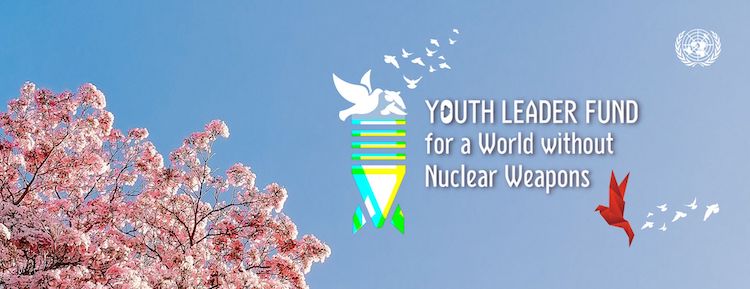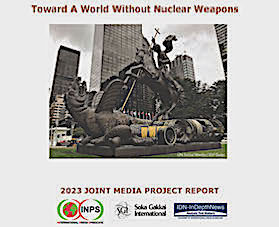By Thalif Deen
UNITED NATIONS, 31 May 2023 (IDN) — The United Nations now believes—and perhaps rightly so—that a world free of nuclear weapons should begin primarily with young future leaders.
In pursuing this ambitious goal, the UN Office for Disarmament Affairs (UNODA) and the government of Japan are calling on young people to apply for an innovative learning programme that will empower them to make their contribution to a world free of the deadly weapons. (P07) GERMAN | JAPANESE | HINDI
Applications are now open for a new global training programme called the “Youth Leader Fund for a World Without Nuclear Weapons”.
The training programme, which is run by UNODA and made possible by the generous financial contribution of Japan, offers up to a hundred scholarships for young people aged 18 and over.
The programme is aimed at equipping the leaders of the future “with the knowledge, skills, and network to join global efforts to eliminate nuclear weapons – the most dangerous weapons on earth”.
Last summer, at the tenth Review Conference of the States parties to the Treaty on the Non-Proliferation of Nuclear Weapons (NPT), Prime Minister Fumio Kishida of Japan announced his country’s commitment to contribute ten million US dollars towards the United Nations to establish this new disarmament education and mobilization initiative, which seeks to “bring the lessons of Hiroshima and Nagasaki to the world, and the world to Hiroshima and Nagasaki.”
In a statement released here, UNODA says although nuclear weapons have only been used twice in warfare—in the bombings of Hiroshima and Nagasaki in 1945—about 12,500 reportedly remain in our world today and there have been over 2,000 nuclear tests conducted to date.
“One nuclear weapon can destroy a whole city, potentially killing millions, and jeopardizing the natural environment and lives of future generations through its long-term catastrophic effects,” said UNODA.
The programme is seeking youth who are motivated to use their talents to promote change for a more peaceful and secure world – without nuclear weapons.
“The intention is to bring together an eclectic and geographically diverse group of advocates for nuclear non-proliferation and disarmament”.
In addition to young people interested or active in international affairs, such as government or civil society organisations, those with a background in education, academia, journalism, industry, and other areas, are encouraged to apply.
The programme is open to youth from across the globe, from nuclear-weapon States and non-nuclear-weapon States alike.
Joseph Gerson, President of the Campaign for Peace, Disarmament and Common Security and Convener of the Peace & Planet International Network, told IDN: “I was encouraged to read about UNODA’s Youth Leader program”.
“UNODA’s persistence in working to prevent nuclear war and for arms control and disarmament makes it an invaluable resource for the world’s people”.
“That said, my hope is that beyond learning history, diplomatic and lobbying skills, the Young Leader trainees will also be encouraged to press the limits, to question and challenge illegitimate authority, and at times lead civil society into uncivil actions to disturb the peace of the powers that be who accept and make preparations to inflict nuclear Armageddon,” he pointed out.
With the collapse of the hard-won arms control order, Gerson said, humanity faces growing existential dangers of nuclear war.
“On the one hand, there is the immediate danger that if Russian control of Crimea is seriously threatened, in desperation President Putin may follow through on threats to respond with tactical nuclear weapons”, he warned.
They would have genocidal impacts on Ukraine, Gerson said, and possibly lead to further nuclear escalation. On the other hand, there is the Orwellian manufacturing of consent photo of the G-7 leaders standing in front of the Hiroshima cenotaph near 1945’s ground zero.
“Each of these men and women either preside over first strike nuclear arsenals and doctrines, or as in the case of Japanese Prime Minister Kishida, lead nations whose military centerpiece is reliance on U.S. first strike nuclear attacks,” he declared.
The reality is that humanity faces two urgent existential threats: nuclear war and climate catastrophe. On the eve of the 2010 Nuclear Nonproliferation Treaty Review, then UN Secretary General Ban Ki-moon advised 1,000 civil society nuclear weapons abolitionists from around the world that governments will not deliver us a nuclear weapons-free world.
This can only be achieved by pressure from below. Here’s hoping that the civil society Young Leaders trained in the UNODA program are inclined and encouraged to break the bonds of civility in order to build the popular pressure needed to win new governmental commitments for nuclear disarmament and better ensure human survival, said Gerson.
Meanwhile, UNODA said that over the course of two years, the selected participants will receive training in general principles of nuclear disarmament, non-proliferation, and arms control through online courses, with a selected cohort going on a week-long in-person study tour to Hiroshima and Nagasaki.
The future leaders will also exchange ideas with disarmament experts from think tanks, civil society organizations, media, and the diplomatic field, and develop the practical know-how to engage and contribute on issues related to nuclear disarmament, non-proliferation, and arms control.
Importantly, participants will learn about the lessons that the survivors of the atomic bombings of Hiroshima and Nagasaki, called hibakusha, have long been sharing with the world about the unimaginable suffering that nuclear weapons caused. As the hibakusha continue to age, it is vital that their powerful stories and appeals to eliminate nuclear weapons are carried forward by the future generation.
The programme will start in 2023 and culminate in 2030—a year marked by various milestones, including the 85th anniversary of the atomic bombings of Hiroshima and Nagasaki bombings and the 60th anniversary of the entry into force of the Treaty on the Non-Proliferation of the Nuclear Weapons (NPT).
Upon completion of the programme, the alumni will play a key role in training and mentoring the next cohort of interested young nuclear disarmament advocates. Following the 2023–2025 inaugural training programme under the Youth Leader Fund, three more rounds of similar trainings will be conducted, generating a positive ripple effect, and consolidating a worldwide network of talented future leaders with the shared goal of saving humanity from nuclear weapons.
Through education, skills training, mentoring and other support, the hope is that participants will continue their disarmament and peace and security work in their field of interest and expertise after the programme.
In recent years, UN Secretary-General António Guterres has made a major push to empower youth, recognizing their role as the ultimate force for change and noting that they have proven their power in support of the cause of disarmament.
For more information, visit www.disarmamenteducation.org/ylf. Contact:
Image credit: UNODA













